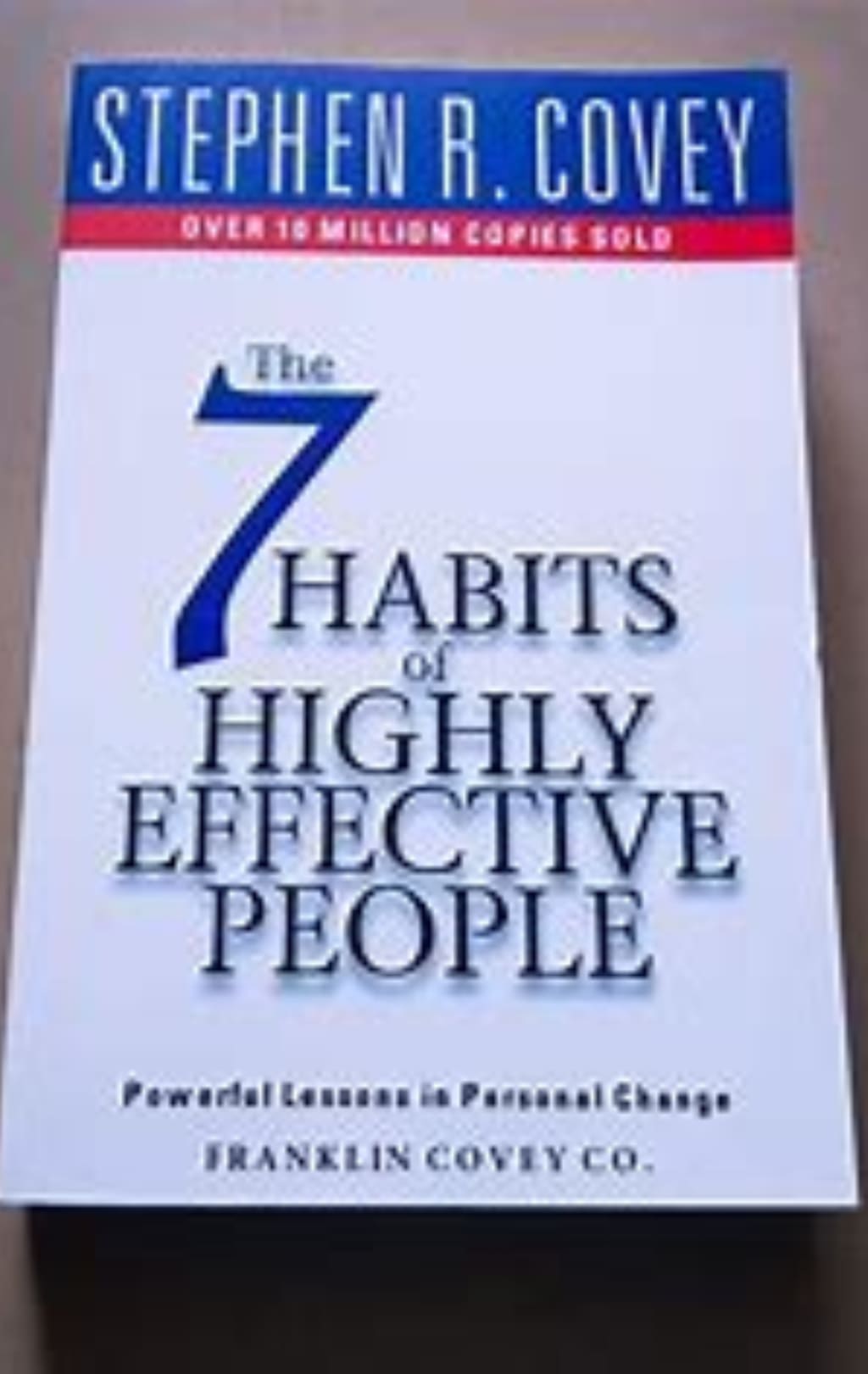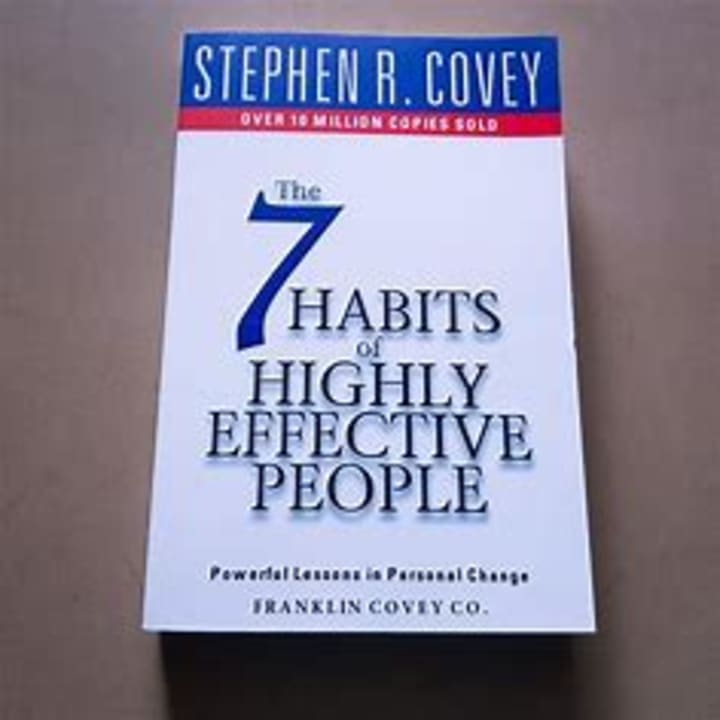
Book Summary: "The 7 Habits of Highly Effective People" by Stephen R. Covey
"The 7 Habits of Highly Effective People" is a groundbreaking self-help book written by Stephen R. Covey. Published in 1989, it has become a global phenomenon, selling over 30 million copies worldwide. Covey's book offers a comprehensive framework for personal and professional effectiveness, presenting seven essential habits that can transform individuals and empower them to lead more fulfilling lives.

The book is divided into four parts, each focusing on a different aspect of personal growth and effectiveness. Let's delve into a summary of each part and explore the key concepts presented by Covey.
Part One: Paradigms and Principles
Covey begins by emphasizing the importance of shifting paradigms, which are the lenses through which we view the world. He argues that our perception and interpretation of events shape our behavior and ultimately determine our level of success. Covey encourages readers to adopt a proactive mindset, taking responsibility for their choices and responses rather than being driven by external circumstances.
He introduces the concept of the "Circle of Influence" and the "Circle of Concern," highlighting the significance of focusing on what we can control and influence. Covey emphasizes the power of personal choice, encouraging individuals to align their actions with their values and principles.
Part Two: Private Victory
In this section, Covey explores the three habits required to achieve personal mastery and private victory. The first habit is "Be Proactive," which emphasizes the importance of taking initiative and being proactive in shaping one's life. Covey emphasizes the power of self-awareness, self-control, and conscious decision-making.
The second habit is "Begin with the End in Mind," encouraging readers to clarify their personal mission and values, and to envision the desired outcomes in different areas of life. Covey highlights the significance of setting clear goals and aligning actions with long-term objectives.
The third habit is "Put First Things First," which focuses on effective time management and prioritization. Covey introduces the time management matrix, categorizing activities based on urgency and importance. He emphasizes the value of spending time on activities that align with one's mission and goals, rather than being consumed by trivial matters.
Part Three: Public Victory
In this part, Covey explores the habits necessary for successful interpersonal relationships and collaboration. The fourth habit is "Think Win-Win," emphasizing the importance of seeking mutually beneficial solutions in all interactions. Covey encourages readers to embrace an abundance mindset, viewing success as a collective achievement rather than a zero-sum game.
The fifth habit is "Seek First to Understand, Then to Be Understood." Covey emphasizes the power of empathic listening and genuine understanding. By seeking to understand others' perspectives and emotions, individuals can build trust, foster effective communication, and resolve conflicts.
The sixth habit is "Synergize," highlighting the value of creative collaboration and teamwork. Covey encourages readers to embrace diversity, leverage differences, and work collaboratively to achieve shared goals. He emphasizes that synergistic relationships create innovative solutions and enhance collective performance.
Part Four: Renewal
Covey concludes the book by discussing the importance of self-renewal and continuous improvement. The seventh habit is "Sharpen the Saw," which emphasizes the need to regularly engage in activities that rejuvenate and enhance one's physical, mental, emotional, and spiritual well-being. Covey argues that self-care and personal renewal are essential for long-term effectiveness and sustained growth.
He presents various strategies for self-renewal, including physical exercise, mental stimulation, relaxation, and spending time in nature. Covey emphasizes the significance of balancing all dimensions of life to achieve holistic well-being.
Conclusion:
"The 7 Habits of Highly Effective People" by Stephen R. Covey provides a transformative framework for personal and professional growth. Covey's book offers practical guidance and timeless principles that can empower individuals to become more proactive, goal-oriented, and effective in their personal and professional lives.
By adopting a proactive mindset and focusing on what is within their control, readers can take ownership of their choices and responses, ultimately leading to personal growth and success. Covey highlights the importance of clarifying one's values and vision, setting goals aligned with these principles, and prioritizing tasks based on their importance and contribution to long-term objectives.
The book also emphasizes the significance of developing strong interpersonal skills and fostering effective relationships. By seeking understanding, practicing empathic listening, and collaborating synergistically, individuals can build trust, enhance communication, and cultivate win-win outcomes in their interactions with others.
Covey stresses the importance of self-renewal as a means to sustain personal effectiveness. Taking time to nurture physical, mental, emotional, and spiritual well-being allows individuals to maintain balance, avoid burnout, and continuously improve themselves.
"The 7 Habits of Highly Effective People" has resonated with millions of readers worldwide because of its practical wisdom and universal applicability. Covey's teachings provide a roadmap for personal growth, offering actionable steps that individuals can take to transform their lives and achieve their goals.
One of the key strengths of the book is its emphasis on character ethics rather than quick-fix techniques. Covey's principles focus on cultivating positive character traits and embodying timeless values such as integrity, honesty, and respect. By prioritizing character development, individuals can lay a solid foundation for lasting success and fulfillment.
Moreover, Covey's approach is holistic, recognizing the interconnectedness of various aspects of life. He encourages readers to consider their physical, mental, social, and spiritual well-being, highlighting the importance of nurturing all these dimensions to lead a balanced and purposeful life.
"The 7 Habits of Highly Effective People" has stood the test of time because its principles are rooted in universal truths and fundamental human values. Covey's insights continue to inspire and guide individuals on their journey towards personal and professional excellence.
In conclusion, "The 7 Habits of Highly Effective People" is a transformative book that offers practical guidance for personal growth and effectiveness. By adopting the seven habits presented by Covey, readers can cultivate a proactive mindset, strengthen their interpersonal skills, and engage in continuous self-renewal. The principles shared in this book have the power to unlock personal potential, foster meaningful relationships, and inspire individuals to lead purposeful and fulfilling lives.
About the Creator
Gokila
She is an astrophile, introvert,
loves to read books all day long,
addicts in healthy lifestyle
and having curiosity to know about new things.
Life Is As Beautiful As You Make It. Contentment Is The Key To Happiness. Peace Be Upon The Saviour.






Comments
There are no comments for this story
Be the first to respond and start the conversation.